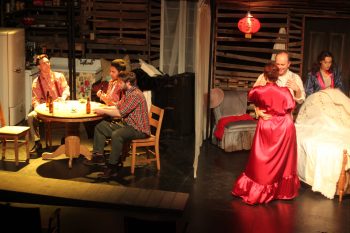November is Family Violence Prevention month and this is a very appropriate time for Spirit Fire Theatre to stage A Streetcar Named Desire. Tennessee Williams’ 1947 classic play that made Stanley Kowalski and the circle of violence famous, all of which still resonates today. With a talented cast, Spirit Fire Theatre puts on a production that sometimes highlights the problems within the script and does have some scenes are a bit contrived, but overall puts forward a strong production; an examination of the conflict between light and dark, brutal and delicate, simple and refined.
The play tells the story of Blanche Dubois (Heyley Feigs), who has traveled a long way to come stay with her sister Stella Kowalski (Sasha Barry) and her husband Stanley Kowalski (David Haysom), because Blanche just lost their family home Belle Reve. Blanche is unmarried, with no money and doesn’t know how long she will be staying with the Kowalskis. They have a two room apartment that isn’t conducive to privacy as Blanche mentions a lot when she first arrives. Blanche’s presence causes a lot of friction as she and Stanley are opposites. Blanche is refined and Stanley is more based in reality. Stanley often erupts in anger and winds up striking his pregnant wife during a poker game, but she forgives him and says to Blanche, ‘that’s just Stanley’s way.’ Blanche and Mitch, (Luigi Riscaldino) one of Stanley’s more sensitive friends strike up a romance, but Stanley interferes with it by digging up Blanche’s past. When Mitch breaks up with her and Stanley commits a brutal act of violence against her, Blanche loses touch with reality.
Spirit Fire Theatre’s production is thoughtful. Hanne Loosen’s set design is two tiered so characters have to run upstairs to the neighbours Eunice (Meg Farhall) and Steve (Michael Rolfe). The Kowalski’s two room apartment is divided by a curtain and the set illustrates how physically close the characters have to live together.
Director Paul Welch has the scenes where Vanessa Jetté sells food as a Mexican woman and a Negro Woman play off on the sides of the stage, in front of the set. These scenes don’t really capture the audience’s attention and don’t really shed light on the main narrative.
A Streetcar Named Desire is a dilemma for the audience. Stanley is brutal and unkind and Haysom embodies his character nicely. Sometimes his physical movements and hand gestures are a bit out of character, but Haysom is menacing as Stanley. Feigs as Blanche is insufferable and vain and this is where the dilemma lies. How much do we believe that Blanche just can’t withstand what is happening to her? Because she comes to stay with the Kowalskis and complains about where they live and who they are as if she deserves so much better. She exhibits this snobbish attitude without remorse, but it doesn’t excuse the violent manner in which Stanley treats her. She doesn’t deserve her demise. But we’re supposed to see Blanche as a weak character. But she comes off as more manipulative and vivacious. Feigs also gets caught in an acting loop towards the end of the play, where there is no diversity as she descends into fantasy. She just wails most of the time. When Stanley commits his last act of violence of her, she supposed to not put up a fight and just accept her fate, as he carries her to the bed because she cannot fight what is happening to her. In Spirit Fire’s production Welch has her scream for Eunice and put up a fight.
Barry is dynamic as Stella. Her performance has the audience internalize that Stella believes that her future lays in her marriage and in being with a man. She hangs on to the times that Stanley is remorseful for hitting her and tries to move through the times he is angry. The audience really feels Stella’s dilemma.
The production runs long and sometimes its pacing lags. Yet the cast is talented and presents the complex narrative with impact.
Spirit Fire Theatre’s production of A Streetcar Named Desire runs until November 26th. More information is available online.
Photo Credit: Meghan Westelmajer

